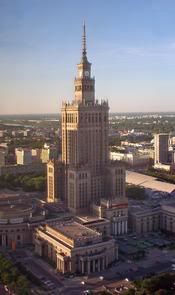Where the Republican party is going to break
Will they choose the free trade or protectionist line? Whichever they choose, they're going to lose a significant chunk of their party. Incidentally, Democrats have to make the same choice.
From The Economist:
America's Congress is taking a harsher line on trade, particularly with China. The Bush administration is also getting into the act, with the treasury secretary and even the newly nominated trade representative talking tough. Is America turning protectionist?
"THESE are not happy times for the dwindling band of free-traders in Washington, DC. Trade sceptics are on the move on two fronts: raising the barricades against the Chinese and refusing to lower them for the Central Americans.
Politicians blame China and its fixed exchange-rate regime for America's trade deficit. But Congress is also sceptical about the Central American Free Trade Agreement. Although CAFTA is small beans in economic terms, failure to get it through would spell ill for any global trade deal at the World Trade Organisation (WTO).
China-bashing has captured the headlines. On April 6th, 67 senators voted against dumping a bill proposed by Charles Schumer, a Democrat from New York, that would impose a 27.5% tariff on all goods from China unless Beijing adjusted its currency—which is fixed to the dollar at an artificially low exchange rate—within six months. Not only is the legislation utterly against WTO rules, it would cause havoc for the American economy. But Mr Schumer has been promised a vote by July, and his bill may well pass the Senate."
The Schumer bill's success, which has surprised even its sponsor, is accelerating other measures. Two more senators, Susan Collins and Evan Bayh, are touting the Stopping Overseas Subsidies Act, which would allow American firms to get countervailing duties to make up for Chinese subsidies, including a subsidised exchange rate. China is not currently subject to America's anti-subsidy law as it is deemed a “non-market economy” (which makes it easier for American firms to file anti-dumping cases against it). But declaring China a market economy for the purposes of subsidies, and a non-market economy for the purposes of anti-dumping, is against WTO rules.
Nobody in Congress, alas, seems to care about breaking WTO rules. The aim is to be seen to be bashing China loudly. Mr Bayh is holding up the confirmation of Rob Portman, the Ohio congressman whom George Bush has nominated for US trade representative, until his bill is voted on. Meanwhile, in the House of Representatives, Duncan Hunter, a conservative Republican, and Tim Ryan, a Democrat, have cooked up a law that allows American companies to use “exchange-rate manipulation” as a reason for demanding protection under America's trade laws. And the Congressional China Currency Action Coalition has filed a Section 301 petition asking the Bush administration to file a formal case to the WTO complaining about the yuan.
In the 1980s, a rising trade deficit—at that time with Japan—fuelled protectionist pressure in Congress. Ronald Reagan introduced the notorious “voluntary export restraints” on Japanese steel and cars. The Reagan team also abandoned its laisser-faire attitude to currency markets and, through the Plaza Agreement, engineered a sharp drop in the dollar.
The current bout of China-bashing is not a replay of the 1980s. Back then, large American firms, particularly the Detroit car giants, led the clamour for protection. Now big business, which relies heavily on Chinese inputs, is quieter. The shouting comes from smaller American suppliers. And even the noisier business groups, such as the National Association of Manufacturers, are relatively nuanced. Though the NAM wants Beijing to revalue the yuan, it does not support the Schumer bill.
Less encouragingly, the political and economic risks are bigger this time round. In the 1980s Japan, for all its faults, was always viewed as a democratic ally in Asia. By contrast, China is now seen as a nasty communist regime and a dangerous rival. In the mid-1980s, America's current-account deficit was smaller, 3.5% of GDP in 1985 compared with 6.3% today, and its debt stock lower. Today, America is the world's biggest debtor, with China as an important creditor. A sharp reversal in China's appetite for American Treasury bonds could send interest rates soaring.
This might come sooner rather than later, according to Alan Greenspan, the chairman of the Federal Reserve. In testimony before the Senate budget committee this week, he stated that the Chinese government’s massive exchange-rate interventions were causing growing imbalances in the domestic economy that will force China to abandon its currency peg. Once this happens, the central bank can stop stockpiling dollar reserves—meaning its demand for American government securities will also dry up. Critics wonder if Congress, which has made little effort to curb America’s soaring budget deficits, has quite thought things through.
For now, the Bush administration seems to be trying to muddle along. It has increased its rhetoric about the need for China to fix its exchange rate. It said this at the G7 meeting of finance ministers on April 16th, and, when the Treasury issues its twice-yearly report on currencies later this month, it is likely to come close to calling China a “currency manipulator”—a term last applied to Beijing in 1994. Even Mr Portman, an ardent free-trader, sounded a harsh note on China during an appearance before the Senate finance committee on April 21st. Saying that the Chinese “do not always play by the rules”, he promised to take a firmer stance than his predecessor, Robert Zoellick. This seems to have garnered approval on both sides of the aisle—though not from Mr Bayh, who said that words were no substitute for action.
The Bush team hopes to keep this sort of grandstanding to a minimum. But the China-bashing in Congress presents a danger. At worst, this frenzy could result in a series of illegal (in WTO terms at least) protectionist bills becoming law. Even if things do not get that far, the China effect will complicate an already tough struggle to get CAFTA through.
Aside from a handful of passionate free-traders, Democrats are solidly opposed to the Central American trade deal, thanks largely to a massive lobbying campaign by the unions. The unions believe (correctly) that if CAFTA is defeated, Mr Bush's trade agenda will lie in tatters. In the face of determined union opposition, Mr Bush is already having trouble persuading many Democrats. Alarmist news about imports from China makes this task much harder.
Another set of CAFTA sceptics—the textile lobby—ought to be brought on board by fears of China. The Central American agreement is in part a way of staving off Chinese textile imports, which have surged since the quota regime ended this January. Without CAFTA, Central America's textile industry is likely to be decimated by Chinese competition. With the special duty-free access that CAFTA grants, Central American textile firms—and the American companies that supply them with material—may survive.
The Bush team is busy making this argument to textile groups. But the opposition against free trade of any sort in hard-hit textile states like the Carolinas is considerable (see article). The White House is thus getting more overt with its bribes, such as its decision to consider safeguard quotas against Chinese imports for several textile products. (The European Union said on April 22nd that it is mulling similar restrictions.)
Another powerful southern lobby, the sugar industry, is proving even harder to placate. Outrageous import quotas keep the domestic price of sugar at double that of the world price. CAFTA would allow more imports in from Central American countries, but still less than 2% of US sugar production. For the sugar lobby—and the 15 or so Republican politicians who follow its bidding—that is still too much.
The betting is that, with enough presidential involvement and vote-buying, Mr Bush may get CAFTA through in the next couple of months. Until he does, there will be little appetite in the White House to give the China-bashing in Congress the cold shoulder that it deserves.
I think this very much ties in with a very interesting discussion on immigration we've been having over at Redneck's Revenge. Will the Republicans start linking populist economic practices with border control? If so, what will happen to all those free traders that joined the party of Lincoln because of its economic policies? What will the result be for the US economy?














